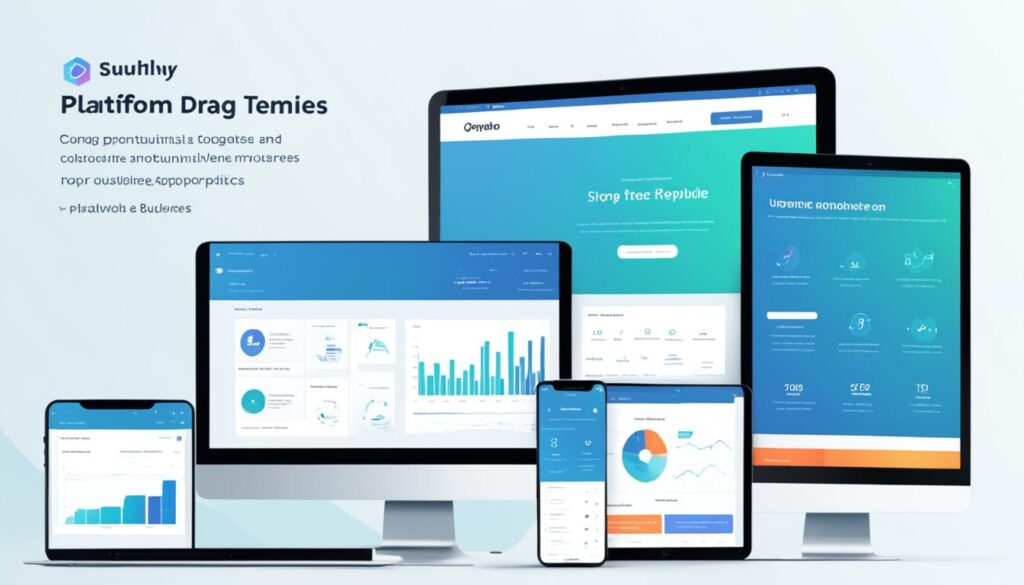Best Low-code App Platforms for 2024 Revealed
Wednesday, 6/12/2024, 8 minutes to read

The best low-code platforms for 2024 have been carefully chosen. This selection involved testing over 2,000 tools and reviewing more than a thousand software choices. These top platforms are great for both professional developers and people new to coding. They use features like drag-and-drop design and simple models to create apps.
Key aspects like pricing and what the platforms offer have been listed in a table. This includes costs from $5 per user per month to $25,000 per year. Platforms like Xano, Appian, Nintex, and Mendix provide this detailed information. Knowing your needs and what each platform offers is vital to pick the right one.
Key Takeaways
- Over 2,000 tools tested for various IT use cases.
- Extensive review of more than a thousand software options.
- Comprehensive evaluation covers core functionalities and standout features.
- Price range from $5/user/app/month to $25,000/year.
- Popular trends include AI integration, Blockchain, and real-time collaboration tools.
Major Trends Influencing Low-code Platforms in 2024
Low-code platforms are quickly changing this year. This change is due to new technologies making development easier and more efficient. These changes are making low-code setups smarter and more powerful. Let’s look at the biggest trends.
Integration with AI and Machine Learning
In 2024, AI and machine learning are changing how we make apps. They’re part of the low-code scene, making complex tasks easier and improving predictions. Things like personalization and voice recognition are getting better. This has made comparing different low-code platforms show that AI ones are the best fit.
Blockchain Integration
Adding blockchain to low-code platforms makes them safer and ensures data is correct. It’s key in sectors like health and finance. Blockchain adds a strong security layer and lets everyone see and track data. This makes low-code platforms more trustworthy for big business apps. By adding blockchain, low-code solutions are headed for success.
Real-time Collaboration Tools
With more people working from different places, real-time teamwork tools are a must. Low-code platforms in 2024 come with strong teamwork features. This lets teams work well even if they’re not in the same place. Top platforms use these tools to create quick, on-demand-style services. They connect service providers with users smoothly.
It’s important for businesses and developers to know these trends. Using new low-code features can spark innovation and speed up digital changes. This can help keep an edge in the fast-evolving app market.
Top Low-code Mobile App Development Platforms for 2024
In the world of mobile apps, platforms like OutSystems, Appian, and Mendix lead the way in 2024. They make creating apps easier and faster. Each platform has its unique benefits for app development.
OutSystems: Industry Leader in Rapid Application Development
OutSystems is famous for quickly making strong apps. It uses less code to build apps fast for both iPhone and Android. This results in great apps that are always improving.

Appian: Streamlined App Creation with Automation Focus
Appian is known for its ease of making apps with a focus on automation. It’s great at simplifying complex processes and making teams more efficient. Its automation tools help businesses make powerful apps with less effort.
Mendix: Ease of Accessibility for Scalable Solutions
Mendix is all about being able to grow as a project grows. It’s good for small tasks or big systems. With tools that help teams work well together, it supports any kind of project. Everyone, whether they know a lot about tech or not, can use Mendix to build great solutions.
| Platform | Key Features | Starting Price |
|---|---|---|
| OutSystems | Rapid app development, single codebase for iOS & Android | $18,000/year |
| Appian | Automation focus, high-level process management | $90/user/month |
| Mendix | Scalability, Agile support, advanced collaboration tools | $1,875/month for Single App |
OutSystems, Appian, and Mendix play a big role in helping companies stay ahead in the app world. These platforms are loved for being efficient, cost-effective, and linking IT with business well. They help teams innovate and succeed.
Evaluation Criteria for the Best Low-code Platforms
Choosing the best low-code app development software means looking at key aspects. These help in picking a platform that meets your goals. They ensure you choose something valuable for your work.

Core Low-code Platform Functionality
Core features are crucial, making up 25% of our assessment. They include drag-and-drop tools, working on different devices, growth flexibility, safety, and linking to other apps. These are key for any strong low-code software to suit various app-making needs.
Additional Standout Features
Special features also weigh in at 25% of the review score. Top low-code systems use new tech, like AI and securely processing data through blockchains. Such features improve the system and make it ready for future needs, like working from anywhere.
Usability and Onboarding Experience
How easy it is to use and start with scores 10%. A clear layout and easy learning steps are key in making a platform great to use. Simple starts help all users become skilled quickly, getting work done faster.
Customer Support and Value for Money
Help when you need it is crucial and makes up 10% of the score. Good support tackles problems fast and keeps development going. Value considers how much you spend relates to the software’s power and future growth, making apps without overspending.
“Over 50% of medium- and large-sized businesses are expected to adopt low-code development platforms as a primary application strategy by 2024.”
This detailed approach helps find low-code platforms not just for now, but future growth too. By looking at functionality, add-on features, ease of use, starting guidance, and help when needed, you can choose well. This leads to smarter app-making without emptying your wallet.
An in-depth look at what’s out there, watching market changes, and new technology helps us choose well. In a world where making apps is easier, but choosing what to use is hard, being thoughtful is key. It helps stay ahead and succeed in making changes that matter.
Conclusion
In wrapping up, it’s clear the use of low-code platforms will change app development. By 2024, more than half of big and medium-sized companies will choose low-code as their main tool (Gartner). This shows how important these tools have become. They are estimated to generate $187 billion by 2030, which is huge.
By 2024, over 65% of all apps will be made with low-code tools. Such a big change will speed up app making and cut costs. It will help all businesses, big or small, to build what they need, quicker. Low-code tools make it simple for both experts and beginners to create new things fast, keeping up with what people want.
These tools are offered at different prices, suiting various pockets, from $5 to $30 per person each month. Take Appian, for example, which costs $75 monthly for each person for at least 100 users. These platforms will let us create 500 million apps using the latest technology by 2023. This shows they can adapt to our future needs very well, too.
It’s important to stay updated and use the best low-code tools. Keeping an eye on what experts say and using new tech like AI and blockchain will improve our digital work. By knowing what’s out there and what’s coming, businesses can choose the right tools. These tools will help make their dreams of new apps come true.
FAQ
What are the best low-code platforms for mobile app development in 2024?
In 2024, top low-code platforms are OutSystems, Appian, and Mendix. They are known for being easy to use, having strong features, and speeding up app making.
How do low-code platforms benefit non-technical users?
Low-code tools use simple drag-and-drop, visuals, and easy connections. This means anyone can make and launch apps, even without a lot of coding knowledge.
What are some key trends influencing low-code platforms in 2024?
In 2024, look out for AI and machine learning making work easier. Blockchain will help apps be safer. And new tools for working together from anywhere will make teams more efficient.
Which low-code platform is best for rapid application development?
OutSystems stands out for quickly building powerful apps.
How do Appian’s features facilitate streamlined app creation?
Appian helps automate tasks and manage processes better. This makes making apps faster and makes businesses work smoother.
What makes Mendix a user-friendly and scalable solution?
Mendix has both an easy-to-use design and grows well. It fits small and big projects, meeting many needs.
What criteria are used to evaluate the best low-code platforms?
Low-code platforms are judged on how well they let you drag and drop, their unique features like AI and blockchain, ease of learning and using, and how good their help and price are.
Why is AI integration important in low-code platforms?
AI in low-code tools helps with tough tasks and makes predictions, boosting how well they work and how efficient they are.
How does blockchain technology improve low-code platforms?
Blockchain makes apps safer and data trustworthy, improving their overall security and reliability.
What are the benefits of real-time collaboration tools in low-code platforms?
Working on apps together in real-time helps far-apart teams join forces, better talk, and up their project game.
How does usability and onboarding experience impact low-code platform selection?
A platform that’s easy to use and learn lowers the time it takes to get used to it. It makes sure people can use everything it offers right away.
Why is customer support and value for money important in choosing a low-code platform?
Good help and a fair price matter a lot. They make sure users get support when they need it, and that the platform is worth its cost for what you get and how you can grow with it.
Other blog posts
Transform your business with innovative technology solutions
Contact us — we'd love to talk about your idea!
📝 Get an Estimate